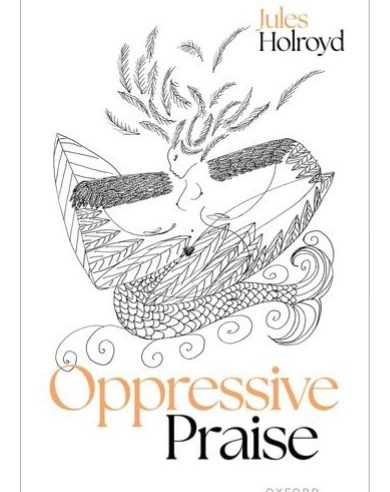Oppressive Praise
6 January 2025
Think about the last time you expressed praise. For me this is easy. As a parent of young children, I do it multiple times a day. ‘How kind you are, sharing your teddy!’ ‘Aw, it sounds like you were a really supportive friend today, that’s lovely’… etc. I’m also really lucky to have awesome colleagues, lovely friends and family, so there too: ‘what a fantastic initiative!’, ‘thank you, that’s so thoughtful …’
Do you praise often? Does it feel like a morally fraught endeavour? Or do you give it little thought?
In all honesty, I spent a lot of time (most of my life!) doling out praise without thinking too much about it. After all, as a positive appraisal, a laudatory expression, it doesn’t seem like much could go wrong with praise. Expressing praise is something that is often encouraged: for example in parenting interventions like the incredible years program, there is emphasis on praise, reward and celebration. Employers often have ‘reward and recognition’ schemes as a way of praising valued contributions in the workplace. Praise seems like a positive phenomenon. And, I think, that is an assumption shared by many philosophers too.
In philosophical works, ‘praise and blame’ are often found on the same page, but typically, authors then go on to focus mainly on blame. Either it is assumed that praise is the positive counterpart of blame, so a symmetrical analysis will apply (McGeer 2019, Vargas 2013). Or, it is assumed that praise needs little justification, since people can’t really be harmed by praise (see e.g. Watson 1996, Nelkin 2011; contrast Stout 2020). Getting blame wrong is a real concern – you unfairly condemn or undeservedly sanction others. But since praise is a positive affair, who really cares if we sometimes get it wrong?
There is *something* to this thought: misplaced blame is almost always cause for concern, correction, and apology, whereas misplaced praise need not be. But that praise might not harm doesn’t mean it never does.
In fact, once we focus on praise, we can think of many ways in which praise might go wrong: it could be condescending, patronising, belittling (see Jeppsson and Brandenburg 2020); it can be used in ways that are manipulative, obsequious; praise can be gushing, or false flattery. In many of these cases, people might intend to use praise in harmful ways. I’m particularly interested in cases where praise might be harmful, even though it is intended to be a genuine positive appraisal.
The literature on microaggressions contains examples of how, even when intended as an expression of genuine positive appraisal, praise might sometimes be deeply problematic. One of the Black participants in Sue et al’s (2008) study reported being praised for being articulate: ““You know, ‘You articulate so well.’ Shouldn’t that be something you expect all your applicants to do? I have a bachelor’s degree. Do you think I didn’t pass seventh grade English?”
Next consider Aubrey Gordon’s description of how anti-fat bias might be conveyed in praise:
‘“You’re so brave to wear that. I wish I had your confidence.” …I smiled and thanked her for the compliment, but I couldn’t figure out what she meant. … What had been so “brave” about wearing such a thoroughly unremarkable, standard dress?
…I was only brave if my body was meant to be a source of shame, something to be shut away, covered up, rarely seen and never discussed.’
Both Sue’s participant, and Aubrey Gordon, point to the fact that praise is keyed to certain expectations. In general, we praise people when they exceed expectations – or when meeting them is challenging, perhaps. But in these cases, the expectations in relation to which praise is expressed are deeply problematic: they are informed by the racism of low expectations; or they encode anti-fat assumptions about the shame fat people are presumed to feel, and to have to ‘overcome’.
These two cases illustrate how praise – even when well-intended – might be oppressive. In their analysis of ‘oppressive things’, Liao and Huebner (2020) focus on the ways in which things might be causally embedded in oppressive structures: caused by, and in turn causing, oppression. We might say that oppressive praise is normatively embedded in oppressive structures: informed by, and in turn further informing, oppressive normative standards. The kind of oppression at stake can be thought of as what Iris Marion Young called ‘cultural imperialism’, whereby ‘the dominant meanings of a society render the particular perspective of one’s own group invisible at the same time as they stereotype one’s group and mark it out as the Other’ (1990/2011, 58–59). These ‘dominant meanings’ can include the social stereotypes that inform our thinking, including the expectations we have of each other, and hold each other to. Oppressive praise can also contribute to, and be informed by, some other forms of oppression Young articulated: marginalisation, exploitation, powerlessness.
I try to bring this phenomenon into focus in my forthcoming book, Oppressive Praise. Doing so prompts us to consider further questions about our social practices of praising, such as: what is the social role of praise? Philosophers who have examined praise have tended to focus on praise as a second-personal phenomenon, communicated from one person to another. I argue this is a mistake: praise has a key role in affirming and entrenching values in a community – including oppressive values. How can we transform those social practices of expressing praise so that they are not oppressive? This also prompts us to consider the norms of praise.
For example, what should we, as praisers, believe about the targets of our praise? In relation to blame, philosophers have suggested we should know, or reasonably believe, that recipients of blame are indeed blameworthy. But if undeserved praise per se doesn’t harm, perhaps we needn’t believe that recipients of praise are indeed praiseworthy. Rather, to avert the harms of oppressive praise, we ought to believe that our praise is not normatively embedded in oppressive expectations; that the social meaning of our praise does not entrench oppressive values.
What other norms of praise are there? Philosophers have considered standing or distributive norms: from what social position should we praise, and what heed should we pay to how we distribute our praise? How might thinking about oppressive praise shape our understanding of these norms? In the book I formulate and evaluate a set of norms for expressing praise.
I expect many of us have been recipients of praise. Hopefully that has been welcome, but many of us may have had the experience of being the recipients of oppressive praise. Are there better and worse ways to respond? What about if we are bystanders to such expressions of oppressive praise? And what should we think about certain institutionalised forms of praise, such as the use of statues to honour? My hope is that the book offers an understanding of oppressive praise and also an ameliorative framework, so that we can improve how we praise.
I do think it is worth attending to how praise can be oppressive, or otherwise harmful; so it is worth carefully scrutinising our practices of expressing praise. But this is not to say there is not immense value in praising, when we do it well. I will continue to praise my children, colleagues, friends and family effusively; but hopefully, in ways that are now more considered, and not harmful or oppressive!
Link to forthcoming book: https://global.oup.com/academic/search?q=oppressive+praise&cc=gb&lang=en
Gordon, A. 2020a. ‘Please Don’t Call Fat People “Brave” Just for Existing.’ Self.com. Oct 12. https://www.self.com/story/fatness-bravery-bias
Jeppsson, S. and Brandenburg, D. 2022. ‘Patronizing Praise’. The Journal of Ethics, 1–20.
Liao, S., & Huebner, B. Oppressive Things. Philos Phenomenol Res. 2021; 103: 92–113. https://doi.org/10.1111/phpr.12701
McGeer, V. 2019. ‘Scaffolding agency: A proleptic account of the reactive attitudes’. European Journal of Philosophy 27(2), 301–323. https://doi.org/10.1111/ejop.12408
Nelkin, D. K. (2011). Making Sense of Freedom and Responsibility. Oxford University Press.
Stout, N. (2020). “On the Significance of Praise.” American Philosophical Quarterly 57(3): 215–26.
Sue, Derald Wing, Christina M. Capodilupo, and Aisha Holder. “Racial microaggressions in the life experience of Black Americans.” Professional Psychology: Research and Practice 39, no. 3 (2008): 329.
Vargas, M. 2013. Building better beings: A theory of moral responsibility. Oxford: Oxford University Press.
Watson, G. (1996). “Two Faces of Responsibility.” Philosophical Topics 24(2): 227–48.
Young, I. M. 1990/2011. Justice and the Politics of Difference. Princeton University Press.
Beautiful cover art by Céline Siani Djiakoua
- October 2025
- September 2025
- August 2025
- July 2025
- June 2025
- May 2025
- April 2025
- March 2025
- February 2025
- January 2025
- December 2024
- November 2024
- October 2024
- September 2024
- August 2024
- July 2024
- June 2024
- May 2024
- April 2024
- March 2024
- February 2024
- January 2024
- December 2023
- November 2023
- October 2023
- September 2023
- August 2023
- July 2023
- June 2023
- May 2023
- April 2023
- March 2023
- February 2023
- January 2023
- December 2022
- November 2022
- October 2022
- September 2022
- August 2022
- July 2022
- June 2022
- May 2022
- April 2022
- March 2022
- February 2022
- January 2022
- December 2021
- November 2021
- October 2021
- September 2021
- August 2021
- July 2021
- June 2021
- May 2021
- April 2021
- March 2021
- February 2021
- January 2021
- December 2020
- November 2020
- October 2020
- September 2020
- August 2020
- July 2020
- June 2020
- May 2020
- April 2020
- March 2020
- February 2020
- January 2020
- December 2019
- November 2019
- October 2019
- September 2019
- August 2019
- July 2019
- June 2019
- May 2019
- April 2019
- March 2019
- February 2019
- January 2019
- December 2018
- November 2018
- October 2018
- September 2018
- August 2018
- July 2018
- June 2018
- May 2018
- April 2018
- March 2018
- February 2018
- January 2018
- December 2017
- November 2017
- October 2017
- September 2017
- August 2017
- July 2017
- June 2017
- May 2017

